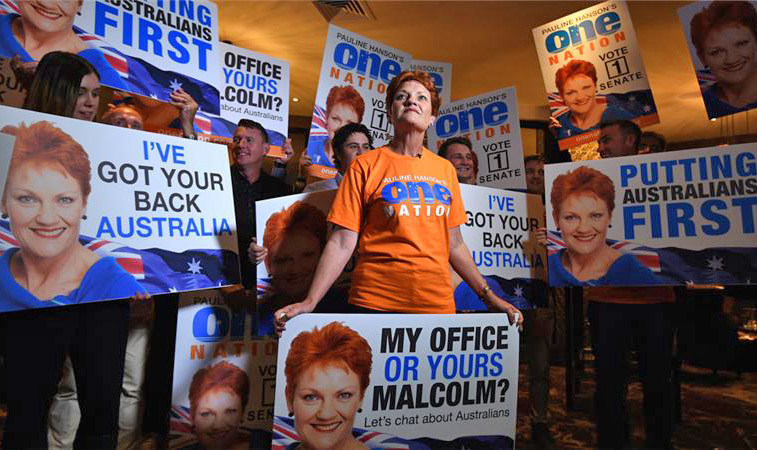Australia/Israel Review
The Last Word: One (Abomi)nation
Aug 3, 2016 | Jeremy Jones

Jeremy Jones
A week before the Australian Federal Election, I was in Melbourne to participate in Limmud Oz, a two day festival of learning, deliberation and debate on matters of specific interest to the Jewish community.
One of the sessions in which I spoke was a panel discussion on the concerns of the voting Jewish public.
The anti-immigration, anti-Muslim, anti-multiculturalism parties did not feature.
Perhaps we panellists imagined no person who benefitted from our culturally and religiously accepting ethos, certainly no person who was aware of the destructive nature of racism and bigotry, was considering giving them support.
After seeing that the fringe right-wing party (out of a number of possibilities) which had done best at the polls was One Nation, and hearing the leader of that party speak, I was quoted in the media as saying:
“Racism and bigotry is always unacceptable, and it is additionally repugnant when espoused by an elected member of parliament. Even before votes have been tallied, Pauline Hanson has, in effect, declared war on Australian tolerance, community harmony and social cohesion, and her bigotry should be exposed for the evil which it is. . . . even if One Nation actively had never promoted antisemitism, I would be just as concerned with its return to political life.”
This led to a torrent of abuse, attacks on my character, and integrity, and much more – from the political right and left. The former seemed to suggest I may as well strap on a suicide belt and join Daesh while some from the left said I had no authority to criticise racism as I am a Jew without suitable revolutionary credentials.
Although it is not, in this matter, my primary concern, some of my Jewish critics challenged me to provide not just evidence that anti-Asian, anti-Arab, anti-Muslim and anti-Indigenous Australian prejudice was a “Jewish” matter, but that there was something specifically to concern me as a Jewish person.
Given that we didn’t suddenly witness the spontaneous generation of One Nation, I would have hoped that the past experience would be a helpful guide.
We had:
• One Nation’s Queensland branch’s newspaper publishing an obscene antisemitic cartoon and an article full of the most repugnant Jewish stereotyping and bile one can imagine.
• Newsletters from a variety of One Nation branches featuring in a succession of studies of antisemitism in Australia due to their republication of anti-Jewish conspiracy theories.
• A webmaster for One Nation simultaneously publishing a newsletter which disseminated numerous anti-Jewish slurs.
• A variety of anti-Jewish groups acting as if they were not just validated but empowered to spread malice and deceit.
• The preselection of candidates for office – including the number two for the Senate in Queensland (at the time of writing considered a likely victor) – who have track records of promotion of dangerous myths which could promote antisemitism.
Do I have Pauline Hanson on record attacking me personally, my religion or my community? No.
Does that mean I should not consider her and her followers a threat to my well-being and to the Australia I value? Definitely not.
One final comment:
On the September 1996 day Pauline Hanson gave her first speech, as an Independent in the House of Representatives, I was in Parliament House.
My presence was as part of a delegation led by Diane Shteinman, President of the Executive Council of Australian Jewry, meeting with Senator Dr. John Herron, the then Minister for Aboriginal and Islander Affairs.
We had come to discuss racism in Australia, and he asked us, quite genuinely, why racism directed at Indigenous Australians was of such concern to us that we had sought a meeting with him.
By the end of our meeting – which also involved a staffer who, until that time, had never shared her regular experience of racism with her employer – he understood, appreciated and thanked us for our concerns.
In opposing racism and other attacks on the fabric of our society, I don’t ask for thanks. But, hopefully, I will be clearly understood.
Tags: Australasia






